七年级下册unit3英语知识点
初中英语人教版七年级下册Unit 3 How do you get to school知识点
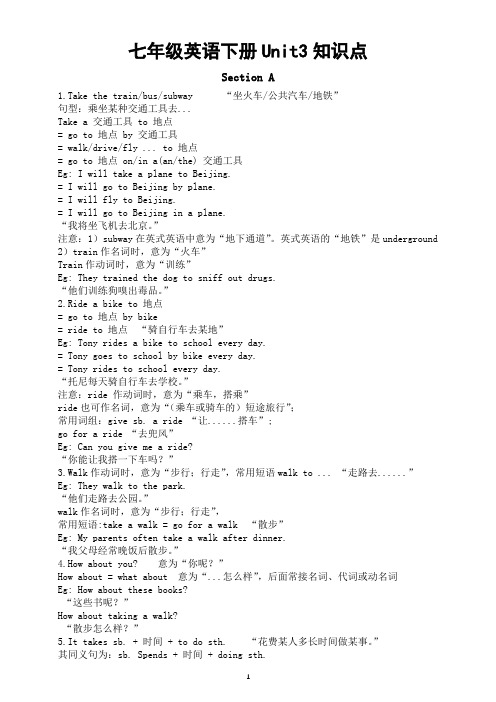
七年级英语下册Unit3知识点Section A1.Take the train/bus/subway “坐火车/公共汽车/地铁”句型:乘坐某种交通工具去...Take a 交通工具 to 地点= go to 地点 by 交通工具= walk/drive/fly ... to 地点= go to 地点 on/in a(an/the) 交通工具Eg: I will take a plane to Beijing.= I will go to Beijing by plane.= I will fly to Beijing.= I will go to Beijing in a plane.“我将坐飞机去北京。
”注意:1)subway在英式英语中意为“地下通道”。
英式英语的“地铁”是underground 2)train作名词时,意为“火车”Train作动词时,意为“训练”Eg: They trained the dog to sniff out drugs.“他们训练狗嗅出毒品。
”2.Ride a bike to 地点= go to 地点 by bike= ride to 地点“骑自行车去某地”Eg: Tony rides a bike to school every day.= Tony goes to school by bike every day.= Tony rides to school every day.“托尼每天骑自行车去学校。
”注意:ride 作动词时,意为“乘车,搭乘”ride也可作名词,意为“(乘车或骑车的)短途旅行”;常用词组:give sb. a ride “让......搭车”;go for a ride “去兜风”Eg: Can you give me a ride?“你能让我搭一下车吗?”3.Walk作动词时,意为“步行;行走”,常用短语walk to ... “走路去......”Eg: They walk to the park.“他们走路去公园。
七年级下册英语知识点总结unit3

七年级下册英语知识点总结unit3 Unit 3是七年级下册英语中的重要章节,包括了关于“Where did you go on vacation?”话题的语言知识学习。
本文将总结这一单元中的主要知识点,帮助同学们学习和复习英语知识。
一、动词过去式在本单元中,我们学习了动词过去式的构成。
对于一般动词,加ed,如“ visit-visited”, “stay-stayed”,“rent-rented”等。
irregular verbs(不规则动词)不遵循这个规则,要在记忆时重点记忆这些例外动词的变形。
如“go-went”,“eat-ate”,“see-saw”等。
二、特殊疑问句的构造特殊疑问句也是本单元中的重点,我们学习了如何使用特殊疑问句来询问別人的去向。
特殊疑问句可以通过疑问词(如what, where, when, how)的询问构成,如 "Where did you go on vacation?", "When did you visit your grandparents?"等。
三、介词 at, in, on的区别和用法本单元中,我们也学习了介词at, in 和 on的区别和用法。
其中的细节是很重要的,因为这些介词的用法在表达时间和地点上是非常频繁的。
简单总结下,at 用于特定的时间点,如“at 9o'clock”,“at Christmas”, “at the party”, on 用于特定的日期或日子,例如“on Monday”,“on December 25th”,“on the weekend”, in 用于一段时间内,如“in June”,“in the afternoon”,“in summer”,“in 2019”。
四、冠词的使用本单元中我们也学习了冠词的用法。
不定冠词“a”和“an”用于表示单数可数名词,而定冠词“the”在特定情境下指特定的名词。
七年级英语下册第三单元unit3知识点
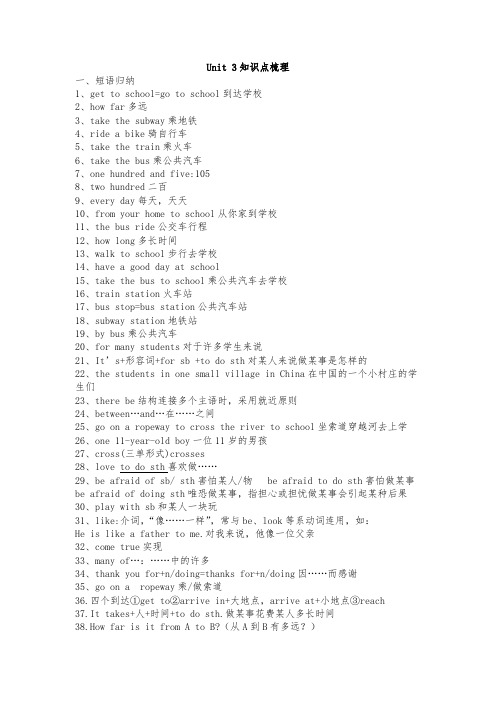
Unit 3知识点梳理一、短语归纳1、get to school=go to school到达学校2、how far多远3、take the subway乘地铁4、ride a bike骑自行车5、take the train乘火车6、take the bus乘公共汽车7、one hundred and five:1058、two hundred二百9、every day每天,天天10、from your home to school从你家到学校11、the bus ride公交车行程12、how long多长时间13、walk to school步行去学校14、have a good day at school15、take the bus to school乘公共汽车去学校16、train station火车站17、bus stop=bus station公共汽车站18、subway station地铁站19、by bus乘公共汽车20、for many students对于许多学生来说21、It’s+形容词+for sb +to do sth对某人来说做某事是怎样的22、the students in one small village in China在中国的一个小村庄的学生们23、there be结构连接多个主语时,采用就近原则24、between…and…在……之间25、go on a ropeway to cross the river to school坐索道穿越河去上学26、one 11-year-old boy一位11岁的男孩27、cross(三单形式)crosses28、love to do sth喜欢做……29、be afraid of sb/ sth害怕某人/物 be afraid to do sth害怕做某事be afraid of doing sth唯恐做某事,指担心或担忧做某事会引起某种后果30、play with sb和某人一块玩31、like:介词,“像……一样”,常与be、look等系动词连用,如:He is like a father to me.对我来说,他像一位父亲32、come true实现33、many of…:……中的许多34、thank you for+n/doing=thanks for+n/doing因……而感谢35、go on a ropeway乘/做索道36.四个到达①get to②arrive in+大地点,arrive at+小地点③reach37.It takes+人+时间+to do sth.做某事花费某人多长时间38.How far is it from A to B?(从A到B有多远?)39.4个花费①take主语为it,花费时间,句型为It takes+人+时间+to do sth.做某事花费某人多长时间②spend主语为人,既花费时间,又花费金钱。
七年级英语下册 Unit 3 单词表及重点词汇整理

七年级英语下册 Unit 3 单词表及重点词汇整理一、Unit 3 单词表1. Words related to school subjects•Chinese: 中文,语文•English: 英语•Math: 数学•Physics: 物理•Chemistry: 化学•Biology: 生物•History: 历史•Geography: 地理•Art: 美术•Music: 音乐•PE (Physical Education): 体育2. Words related to classroom objects•Pen: 钢笔•Pencil: 铅笔•Ruler: 尺子•Eraser: 橡皮擦•Book: 书•Notebook: 笔记本•Desk: 课桌•Chair: 椅子•Blackboard: 黑板•Whiteboard: 白板3. Words related to school activities •Study: 学习•Read: 阅读•Write: 写•Listen: 听•Speak: 说•Practice: 练习•Homework: 家庭作业•Test: 测试•Exam: 考试•Grade: 成绩4. Words related to expressions and greetings •Hello: 你好•Hi: 嗨•Good morning: 早上好•Good afternoon: 下午好•Good evening: 晚上好•Goodbye: 再见•Thank you: 谢谢•Sorry: 对不起•Please: 请•Excuse me: 打扰一下二、Unit 3 重点词汇整理1.School subjects:–Chinese (中文)–English (英语)–Math (数学)–Physics (物理)–Chemistry (化学)–Biology (生物)–History (历史)–Geography (地理)–Art (美术)–Music (音乐)–PE (Physical Education) (体育) 2.Classroom objects:–Pen (钢笔)–Pencil (铅笔)–Ruler (尺子)–Eraser (橡皮擦)–Book (书)–Notebook (笔记本)–Desk (课桌)–Chair (椅子)–Blackboard (黑板)–Whiteboard (白板)3.School activities:–Study (学习)–Read (阅读)–Write (写)–Listen (听)–Speak (说)–Practice (练习)–Homework (家庭作业)–Test (测试)–Exam (考试)–Grade (成绩)4.Expressions and greetings:–Hello (你好)–Hi (嗨)–Good morning (早上好)–Good afternoon (下午好)–Good evening (晚上好)–Goodbye (再见)–Thank you (谢谢)–Sorry (对不起)–Please (请)–Excuse me (打扰一下)以上是七年级英语下册 Unit 3 的单词表及重点词汇整理,掌握这些词汇将有助于学生学习和理解本单元的教学内容。
七年级英语下册Unit3Howdoyougettoschool全部重要知识点(带答案)

七年级英语下册Unit3Howdoyougettoschool全部重要知识点单选题1、—______ is it from your home to your school?—It is about 10 minutes' ride.A.How longB.How soonC.How farD.How often答案:C句意:——从你们家到学校有多远?——大约十分钟的车程。
A. How long多长时间,用来询问时间长短;B. How soon多久以后,对将来的一段时间提问;C. How far多远,用来询问距离远近;D. How often多久一次,用来询问频率。
根据答语可知,问句是询问距离,故答案为C。
2、—What time does the library open in the morning?—It opens ________ 9 a.m.A.inB.onC.atD.between答案:C句意:——上午图书馆什么时间开?——上午九点开门。
考查介词。
in 用于表示世纪、年、月、季节,在上午或下午等;on用于表示确定的时间,具体某天或具体某一天的上午下午晚上或一般节日等;at表示在具体的时间点,常用于表示钟点、夜里、中午、拂晓等的词组中;between指在二者之间。
根据“9a.m.”可知表达的是具体的时间九点钟。
用介词“at”。
故选C。
3、Only through great ________ and hard work can you reach your final goal. A.dreamB.effortC.praiseD.success答案:B句意:只有通过巨大的努力和勤奋工作,你才能达到你的最终目标。
考查名词词义辨析。
dream梦想;effort努力;praise赞扬;success成功。
由“hard work”可推测要想达到最终目标,就要付出巨大的努力。
故选B。
4、There are ________ birds living on the beautiful island.A.hundred ofB.hundreds ofC.two hundredsD.two hundred of答案:B句意:有成百上千只鸟生活在这个美丽的岛上。
七年级英语unit3知识点总结
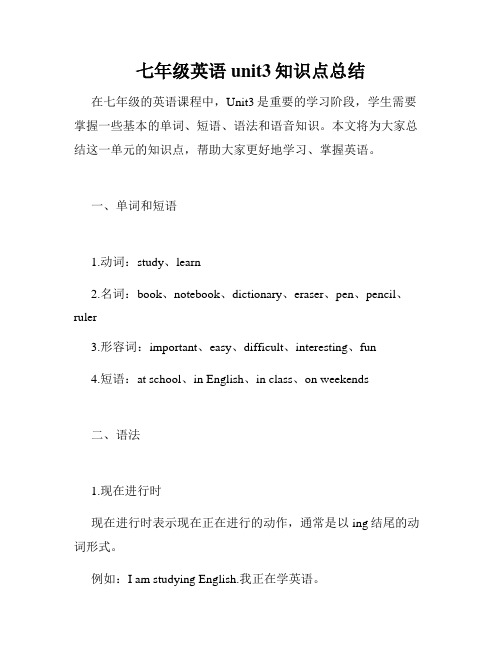
七年级英语unit3知识点总结在七年级的英语课程中,Unit3是重要的学习阶段,学生需要掌握一些基本的单词、短语、语法和语音知识。
本文将为大家总结这一单元的知识点,帮助大家更好地学习、掌握英语。
一、单词和短语1.动词:study、learn2.名词:book、notebook、dictionary、eraser、pen、pencil、ruler3.形容词:important、easy、difficult、interesting、fun4.短语:at school、in English、in class、on weekends二、语法1.现在进行时现在进行时表示现在正在进行的动作,通常是以ing结尾的动词形式。
例如:I am studying English.我正在学英语。
2.一般现在时一般现在时表示经常、习惯性地发生的动作或状态。
例如:I go to school every day.我每天都上学。
3.人称代词人称代词是表示人的身份的代词,用来代替某个人或一组人。
例如:I(我)、you(你)、he(他)、she(她)、it(它)、we(我们)、they(他们)。
三、语音1.长音和短音长音和短音是英语中的两种基本发音方式,必须掌握。
例如:cat(短音)、cake(长音)2.重读音节在英语单词中,有些音节的发音比其他音节更强烈,这种音称为重读音节。
例如:computer(com-PUT-er)以上就是七年级英语Unit3的主要知识点总结,希望本文对大家的英语学习有所帮助。
在学习英语的过程中,要积极听、说、读、写,多练习,做到理论与实践相结合,才能在英语学习中获得更好的成就。
新目标英语七年级(下)Unit_3知识要点归纳

知【重点词汇】train火车subway 地铁ride 骑旅程minute 分钟far &远;远的kilometer千米;公里new 新的;刚出现的drive 开车live 生活;居住stop 车站停止cross 横过;越过afraid 害怕的;畏惧的leave 离开dream 梦想;睡梦true 真的;符合事实的bridge 桥take the subway 乘地铁ride a bike 骑自行车how far 多远how long 多长时间walk to school 步行去上学get to school 到校by bus 乘公汽by bike 骑自行车by train 乘坐火车by boat 乘坐小船cross the river 过河come true 实现;成为现实【重难点句子】1.It takes sb.some time to do sth.花费某人一段时间去做某事例如:It takes me twenty minutes to get to school on foot every morning.我每天早上花20分钟步行到学校。
☆take 还有“乘;坐”之意例如:Shall we go by bus or take a cab?我们是乘公共汽车去还是乘出租去?2.The bus ride is never boring because I always talk to my classmates.坐公交车从不会无聊,因为我总是跟同学们聊天。
在这句话中ride 是名词,表示“行程”。
How 引导的特殊疑问句3.用How do you...?询问别人做某事的方式。
回答可以用by sth.或take sth.的结构。
4.How far 引导的特殊疑问句用来询问两地之间的距离。
34Copyright ©博看网. All Rights Reserved.。
七年级英语下册第三单元

七年级英语下册第三单元知识点总结一、词汇与短语1. 动词- have:拥有,具有。
例如:I have a new book.(我有一本新书。
)- collect:收集。
例如:She collects stamps.(她收集邮票。
)- play:玩,演奏。
例如:I play the piano.(我弹钢琴。
)- show:展示,给……看。
例如:Can you show me your photos?(你能给我看看你的照片吗?)2. 名词- thing:事物,东西。
例如:What's that thing over there?(那边那个东西是什么?)- hobby:爱好。
例如:My hobby is reading.(我的爱好是阅读。
)- club:俱乐部。
例如:He is a member of the basketball club.(他是篮球俱乐部的成员。
)- story:故事。
例如:I like listening to stories.(我喜欢听故事。
)3. 其他- a lot of:许多,大量。
例如:She has a lot of friends.(她有很多朋友。
)- in one's free time:在某人的空闲时间。
例如:I often read books in my free time.(我经常在空闲时间读书。
)- be interested in:对……感兴趣。
例如:I'm interested in science.(我对科学感兴趣。
)二、语法与句型1. 一般现在时- 描述经常发生的动作或存在的状态。
例如:I usually go to school by bike.(我通常骑自行车上学。
)- 第三人称单数形式的变化:动词后加-s或-es。
例如:He watches TV every day.(他每天都看电视。
)2. 特殊疑问句- 结构:特殊疑问词+ 一般疑问句。
Unit3知识点大汇总人教版英语七年级下册

Unit3SectionA知识点1.ride v.&n.(1)作动词讲,意为“骑”。
过去式为rode常用结构:ride a/one's bike骑自行车e.g.He often rides his bike to school.他经常骑自行车去学校。
(2)作名词讲,意为“旅程”常用结构:go for a ride去兜风give sb. a ride让某人搭车e.g. I guess it is about an hour's bus ride to get there.我想乘公交车到那里要大约一个小时吧。
Can you give me a ride to the supermarket?你能让我搭车去超市吗?I'd like to go for a ride.我想出去兜风。
2.hundred 一百(1)当表示具体的“几百”时,用“基数词+hundred”表示,注意此时hundred用单数形式,且其后不能加ofe.g.There are about eight hundred students in our school.我们学校大约有八百名学生。
(2)hundreds of 表示“数以百计的,成百上千的”,此时不能与数词连用e.g.There are hundreds of people in the restaurant.这家餐馆里有数百人。
【拓展】类似用法的词:thousand千million百万billion亿3.far adv.&adj.远;远的常用短语:far from离...远e.g.My home is very far from here.我家离这里很远。
How far is it from your home to school?从你家到学校有多远?【注意】far表示笼统、模糊概念的“远”,若要表示具体的“远”应该用away。
e.g.My home is 10 kilometers away from here.我家离这儿10千米远。
[全]人教版七年级英语下册unit3单词、知识梳理、词汇句型精讲
![[全]人教版七年级英语下册unit3单词、知识梳理、词汇句型精讲](https://img.taocdn.com/s3/m/423f4bb2f5335a8102d220e1.png)
人教版七年级英语下册unit3单词、知识梳理、词汇句型精讲Unit3 How do you get to school?1Unit 3单词(音标)train [tren] n.火车bus [bs] n.公共汽车;公交车subway ['sbwe] n.地铁take the subway 乘地铁ride [rad] v.骑n.旅程bike [ba k] n. 自行车ride a bike 骑自行车sixty ['skst] num.六十seventy ['sevnt] num.七十eighty ['et] num.八十ninety['nant] num.九十hundred ['hndrd] num.一百minute['mnt] n.分钟far [fɑ] adv. & adj. 远;远的kilometer ['kl,mit(r)] n.公里new [nju] adj. 新的;刚出现的every ['evr] adj. 每一;每个every day 每天by [ba] prep. (表示方式)乘(交通工具)by bike 骑自行车drive [drav] v. 开车car [kɑ] n.小汽车;轿车live[lv] v. 居住;生活stop [stɑ:p][stp] n. 车站;v. 停止think of 认为cross [krs] v.横过;越过river ['rv] n.河;江many ['men] adj. & pron.许多village ['vld] n.村庄;村镇between [b'twin] prep.介于…之间between…and…在……和……之间bridge [brd] n.桥boat [bt] n.小船ropeway ['rpwe] n.索道year [j] [ j] n.年;岁afraid ['fred] adj.害怕;惧怕like [lak] prep.像;leave [liv] v.离开dream [drim] n.梦想;睡梦v.做梦true [tru] adj.真的;符合事实的come true实现;成为现实Dave[deiv] 戴夫(男名2 Unit3 知识梳理◆短语归纳1. get to school 到达学校2. take the subway 乘地铁3. ride a bike 骑自行车4. how far 多远5. from home to school 从家到学校6. every day 每天7. take the bus 乘公共汽车8. by bike 骑自行车9. bus stop 公共汽车站10. think of 认为11. between…and…在…和…之间12. one 11-year-old boy 一个11岁的男孩13.play with…和…玩14. come true 实现15. have to 不得不◆用法集萃1. take…to…= go to…by…乘…去…2. How do/does sb get to…? 某人是怎样到…的?3. How far is it from…to…? 从…到…有多远?4. It takes sb. some time to do sth. 做某事花费某人多长时间。
人教版七年级下册英语第三单元知识点梳理

人教版七年级下册英语第三单元知识点梳理Unit 3 How do you go to school一、词汇与短语◆重点单词◆重点句子◆重点单词变形二、语法知识点A部分知识点1.与how构成的词组引导的特殊疑问句❶ how表示爱好、程度、看法等,意为“……怎么样?”。
eg:—How do you like the music?你觉得这首乐曲如何?—I like it very much.我非常喜欢它。
How is your Chinese?你的汉语如何?How do you like China?你认为中国怎么样?❷用于询问身体健康状况,意为“……怎么样?”。
eg:How do you do?你好!How are you?你(身体)好吗?❸ how提问交通方式。
其答语分三种情况:◆take a/the+表示交通工具的名词◆by +表示交通工具的单数名词◆on/in+限定词+表示交通工具的名词eg:How do you go to workevery day? 你每天怎样去上班?I take the subway to work. 我乘地铁去上班。
=I go to work by subway.=I go to work in the subway.❹表示感叹。
eg:How cold it is today!今天好冷啊!How hard they are working!他们在多么辛勤地劳动啊!How fast he runs!他跑得多快啊!❺表示某种方式、手段或方法。
eg:How do you spell it?你怎样拼写它?How did he go to schoolyesterday?他昨天是怎样去上学的?How do you know about it?你怎么知道这件事的?❻ how about用于询问或征询意见等,相当于what about,后接名词、代词或动词的-ing形式,意为“……怎么样?”。
七年级下册英语Unit 3 知识点默写
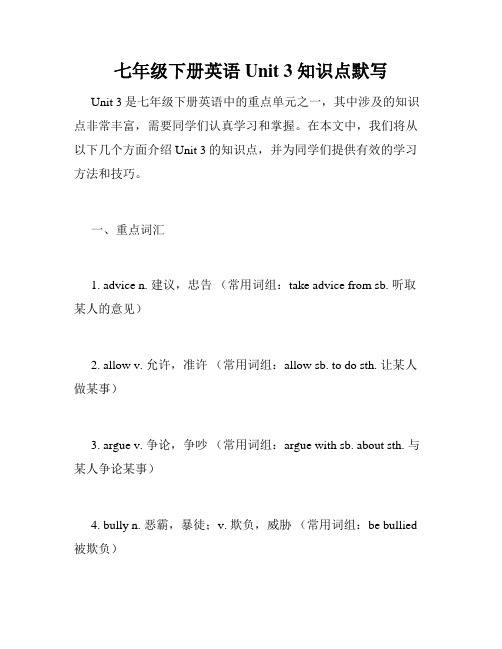
七年级下册英语Unit 3 知识点默写Unit 3是七年级下册英语中的重点单元之一,其中涉及的知识点非常丰富,需要同学们认真学习和掌握。
在本文中,我们将从以下几个方面介绍Unit 3的知识点,并为同学们提供有效的学习方法和技巧。
一、重点词汇1. advice n. 建议,忠告(常用词组:take advice from sb. 听取某人的意见)2. allow v. 允许,准许(常用词组:allow sb. to do sth. 让某人做某事)3. argue v. 争论,争吵(常用词组:argue with sb. about sth. 与某人争论某事)4. bully n. 恶霸,暴徒;v. 欺负,威胁(常用词组:be bullied 被欺负)5. character n. 性格,个性6. experience n. 经历,体验(常用词组:have an experience 有一种经历)7. include v. 包括,包含8. instead adv. 代替,而不是(常用词组:instead of 代替,而不是)9. punish v. 惩罚,处罚(常用词组:be punished for sth. 因某事被惩罚)10. value n. 价值,价值观(常用词组:have different values 有不同的价值观)二、重点语法1. 一般现在时一般现在时表示现在正在发生的动作或状态,它的构成为主语+动词原形,如:I eat breakfast every day. 我每天吃早饭。
They often go to the park on weekends. 他们经常在周末去公园。
2. 情态动词情态动词有can、could、may、might、will、would、shall、should、must等,它们不能单独使用,必须和动词原形一起使用。
不同的情态动词表示不同的意义,如:Can you play basketball? 你会打篮球吗?She must study hard. 她必须努力学习。
七年级下册英语unit3知识点总结

七年级下册英语unit3知识点总结Unit 3主要讲述了人们通过不同的方式交流信息,需要了解和运用一些相关的语言知识。
以下是本单元的知识点总结。
一、谈论天气1. 询问天气:What’s the weather like today? 或者How’s the weather today?2. 回答天气:It’s sunny/cloudy/rainy/windy/snowy.3. 谈论明天的天气:What’s the weather going to be like tomorrow? 或者 How will the weather be tomorrow? 表示未来的天气时,需要使用 be going to + 动词原形。
二、表达场所和方位1. 场所:school, hospital, library, park, cinema, supermarket 等。
2. 方位:in/on/under/near/in front of/behind/between 等。
其中,in 表示在场所内部,在图书馆等需要使用。
三、谈论时间1. 询问时间:What time is it? 或者 Can you tell me the time, please?2. 回答时间:It’s … past/to … 或者It’s … o’clock.3. 表示分钟:前面加 past,后面加分钟数;表示到几点,前面加 to,后面加下一小时的数字。
四、描述人物1. 人物外貌:tall/short, thin/fat, long/short hair, big/small nose, blue/brown/green eyes 等。
2. 人物性格:friendly/kind, funny/humorous, serious/shy 或者其他的形容词。
3. 人物喜好:like/love/prefer/ enjoy + 名词/动词ing。
初中英语人教新目标七年级下册Unit 3 How do you get to school单元知识点

七年级英语下册Unit 3知识点【Useful expressions】1.get to school 到达学校2.take the subway 乘地铁3.take the train 乘火车4.take a car 坐小汽车5.take a taxi 乘坐出租车6.take the plane 乘飞机7.take the bus 乘公共汽车8.by bike 骑自行车9.ride a bike 骑自行车10.how far 多远11.from home to school 从家到学校12.every day 每天13.bus stop 公共汽车站14.think of 认为15.between…and…在…和…之间16.one 11-year-old boy 一个11岁的男孩17.play with…和…玩e true 实现19.have to 不得不20.leave home 离开家21.cross the river 过河22.be afraid of 害怕23.be like 像...【Target sentences】How do you get to school?— I ride my bike.2.— How long does it take to get to school?— It takes about 15 minutes.3.— How far is it from your home to school?—It’s only about two kilometers.4.—Does Jane walk to school?—No, she doesn’t.She goes by bike.5.—Do they take the bus to school?—No, they don’t.They walk.6.I ride my bike to the subway station.Then I take the subway.7.Mary wants to know where Bob lives.8.Mary wants to know how far he lives from his grandparents’ ho me.9.For many students, it is easy to get to school.10.There is a very big river between their school and the village.11.One 11-year-old boy, Liangliang, crosses the river every school day.12.But he is not afraid because he loves school.13.He’s li ke a father to me.【Language points】1.take the subway 乘地铁take作动词,意为“乘坐”。
人教版七年级下册英语Unit3知识点语法归纳总结
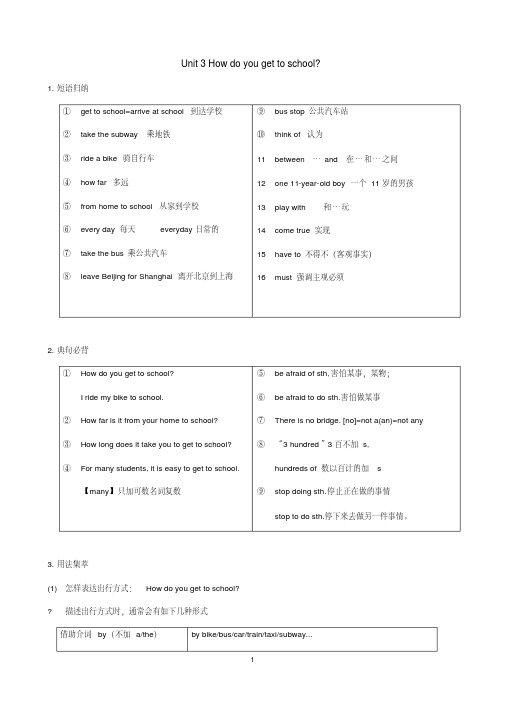
Unit 3 How do you get to school?1.短语归纳①get to school=arrive at school 到达学校②take the subway 乘地铁③ride a bike 骑自行车④how far 多远⑤from home to school 从家到学校⑥every day 每天everyday日常的⑦take the bus 乘公共汽车⑧leave Beijing for Shanghai离开北京到上海⑨bus stop 公共汽车站⑩think of 认为11between … and … 在…和…之间12one 11-year-old boy 一个11岁的男孩13play with … 和…玩14come true 实现15have to 不得不(客观事实)16must 强调主观必须2.典句必背①How do you get to school?I ride my bike to school.②How far is it from your home to school?③How long does it take you to get to school?④For many students, it is easy to get to school.【many】只加可数名词复数⑤be afraid of sth,害怕某事,某物;⑥be afraid to do sth.害怕做某事⑦There is no bridge. [no]=not a(an)=not any⑧“3 hundred” 3百不加s,hundreds of 数以百计的加s⑨stop doing sth.停止正在做的事情stop to do sth.停下来去做另一件事情。
3.用法集萃(1)怎样表达出行方式:How do you get to school?描述出行方式时,通常会有如下几种形式借助介词by(不加a/the)by bike/bus/car/train/taxi/subway...用take,drive, ride构成的动词短take a/the bus/train/plane语drive a/the one’s carride a/the one’s bike/bicycle借助介词on或in(加a/the)on a/the bike/bus/train; on foot; in a/the car注意:当交通工具的名词(如:bike, bus, train, car等)和by搭配时,它们前面不必加冠词;但当它们和on或in搭配时,它们之间要加冠词。
Unit3课堂重点知识点笔记牛津译林版英语七年级下册
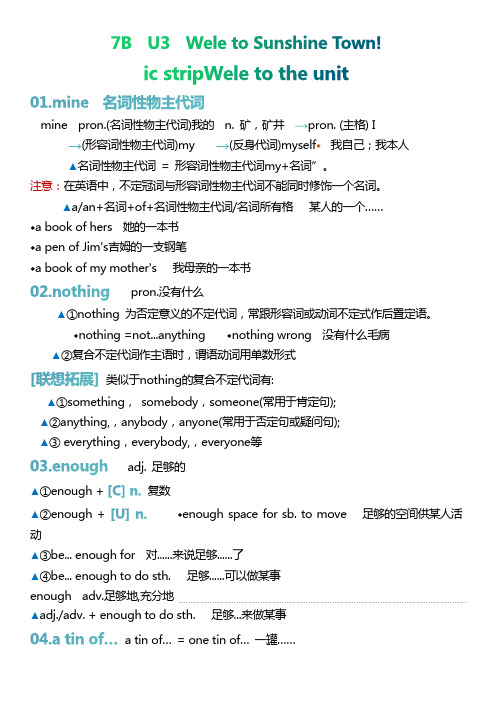
mine pron.(名词性物主代词)我的n. 矿,矿井pron. (主格) I(形容词性物主代词)my (反身代词)myself◆我自己;我本人▲名词性物主代词= 形容词性物主代词my+名词”。
注意:在英语中,不定冠词与形容词性物主代词不能同时修饰一个名词。
▲a/an+名词+of+名词性物主代词/名词所有格某人的一个……◆a book of hers 她的一本书◆a pen of Jim's吉姆的一支钢笔◆a book of my mother's 我母亲的一本书pron.没有什么▲①nothing 为否定意义的不定代词,常跟形容词或动词不定式作后置定语。
◆nothing =not...anything ◆nothing wrong 没有什么毛病▲②复合不定代词作主语时,谓语动词用单数形式类似于nothing的复合不定代词有:▲①something,somebody,someone(常用于肯定句);▲②anything,,anybody,anyone(常用于否定句或疑问句);▲③ everything,everybody,,everyone等adj. 足够的▲①enough + 复数▲②enough + ◆enough space for sb. to move 足够的空间供某人活动▲③be... enough for 对......来说足够......了▲④be... enough to do sth. 足够......可以做某事enough adv.足够地,充分地▲adj./adv. + enough to do sth. 足够...来做某事a tin of…= one tin of…一罐……▲①可以用于“a+量词+of+不可数名词”结构的量词:还有piece,slice,cup,glass ,bottle,bag等。
▲②不可数名词表示具体数量时要借助量词。
◆a piece of paper 一张纸◆two pieces of paper 两张纸◆a slice /piece of bread 一片面包◆a cup of tea 一杯茶◆four cups of tea 四杯茶◆a glass of milk 一杯牛奶▲① order vt. &vi.点(菜);订购◆order sb. sth.= order sth. for sb. 为某人点(菜、饭);为某人订购某物◆order a new dress 订购一条新连衣裙◆order a bowl of noodles 点一碗面条▲② order vt. 命令;n. 顺序,次序◆order sb.to do sth. 命令某人做某事◆order sb. not to do sth. 命令某人不要做某事与order相关的短语及句型:◆in order 整齐,按顺序◆in good order 整齐,有条不紊★Everything is in order. 一切准备就绪。
Unit3知识点归纳人教版英语七年级下册

Unit 3◆短语归纳1.乘火车\公共汽车\飞机\轮船去某地take a\the train\bus\plane\ship to sp.=go to sp. by train\bus\plane\ship2.乘地铁去某地take the subway to sp.=go to sp. by subway3.骑自行车去某地ride a\the\one’s bike to sp.=go to sp. by bike=go to sp. on a\the \one’s bike4.步行去某地walk to sp.=go to sp. on foot5.开车去某地drive a\the\one’s car to sp.=go to sp. by car=go to sp. in a car6.乘出租车去某地take a\the taxi to sp.=go to sp. by taxi=go to sp. in a taxi7.公共汽车之行the bus ride8.自行车十分钟的车程10minute bike ride=10 minutes’ bike ride9.到达学校get to school10.到家get home \ 到这get here \ 到那get there (副词前省略to)11.九百九十九朵玫瑰花(rose) nine hundred and ninetynine roses12.成百上千的村民hundreds of villagers13.离…远be far from… 离…近be near to…14.住得离…远live far from…15.居住在… live in\at…16.过着幸福的生活live\have a happy life17.每天\每星期\每月\每年\每学期every day\week\month\year\term18.公交汽车站bus stop \ 公交客运总站bus station19.在公交车站at the bus stop20.停下来去做某事stop to do sth.停下来去工作stop to work21.停止正在做的事stop doing sth.停止工作stop working22.阻止某人做某事stop sb. (from)doing sth.23.乘索道go on the\a ropeway24.想一下、想一想think of (仔细)思考、考虑think about\think over25.认为think of26.想起think of=think up=e up with27.过马路\过桥\过河cross the road\bridge\river=go\walk across the road\bridge\river28.做索道过河cross the river on a ropeway29.在第二个十字路口at the second crossing30.在你和我之间between you and me31.一个十一岁大的男孩an elevenyearold boy32.一条二十公里长的河流 a twentykilometerlong river33.害怕某事be afraid of sth.34.害怕做某事be afraid of doing sth.= be afraid to do sth.35.像…(品质、性格、外貌) be like36.看起来像(外貌)look like37.想我的父亲一样对我like a father to me38.离开兴城去北京leave Xingcheng for Beijing39.动身前往北京leave for Beijing40.把我的书包落家里leave my schoolbag at home41.梦见某人\某事dream of sb.\sth.E.g.他总是梦到他的母亲。
- 1、下载文档前请自行甄别文档内容的完整性,平台不提供额外的编辑、内容补充、找答案等附加服务。
- 2、"仅部分预览"的文档,不可在线预览部分如存在完整性等问题,可反馈申请退款(可完整预览的文档不适用该条件!)。
- 3、如文档侵犯您的权益,请联系客服反馈,我们会尽快为您处理(人工客服工作时间:9:00-18:30)。
七年级下册unit3英语知识点在学习英语的过程中,掌握好单元知识点显得非常重要。
本文将就七年级下册unit3英语知识点进行总结。
一、词汇
1. 食品类词汇
apple, banana, orange, broccoli, carrot, tomato, chicken, fish, hamburger, pizza, bread, milk等。
2. 衣物类词汇
dress, shirt, T-shirt, skirt, pants, shoes, socks等。
3. 身体部位类词汇
head, face, eye, nose, ear, mouth, neck, arm, hand, finger, leg, foot 等。
4. 数字类词汇
one, two, three, four, five, six, seven, eight, nine, ten等。
5. 其他类词汇
dog, cat, bike, car, student, teacher, book, map, pen, pencil等。
二、语法
1. 一般现在时
在一般现在时中,主语加第三人称单数的动词以-s或-es结尾。
例如:
He watches TV every day.(他每天看电视。
)
She eats an apple.(她吃苹果。
)
2. 句子结构
英语语法中最基本的句子结构是主语+谓语+宾语。
例如:
I have a book.(我有一本书。
)
She likes pizza.(她喜欢比萨饼。
)
3. 名词性物主代词
名词性物主代词有my, your, his, her, its, our, their 等。
例如:
This is my bag.(这是我的书包。
)
That is his book.(那是他的书。
)
4. 现在进行时
现在进行时表示现在(说话时)正在进行的动作,用be动词的现在分词。
例如:
He is playing basketball now.(他正在打篮球。
)
They are watching TV.(他们正在看电视。
)
三、交际用语
1. 打招呼和道别
打招呼一般用Hello, Hi, Good morning/afternoon/evening等。
道别一般用see you later, bye等。
2. 询问和告知
询问一般用What’s your name?, How are you?等。
告知一般用My name is…, I am fine等。
3. 请求和感谢
请求一般用Can you…?, May I…?等。
感谢一般用Thank you, Thanks等。
以上就是七年级下册unit3英语知识点的总结,希望能对您的学习有所帮助。
祝大家在学习英语的道路上越来越顺利!。
